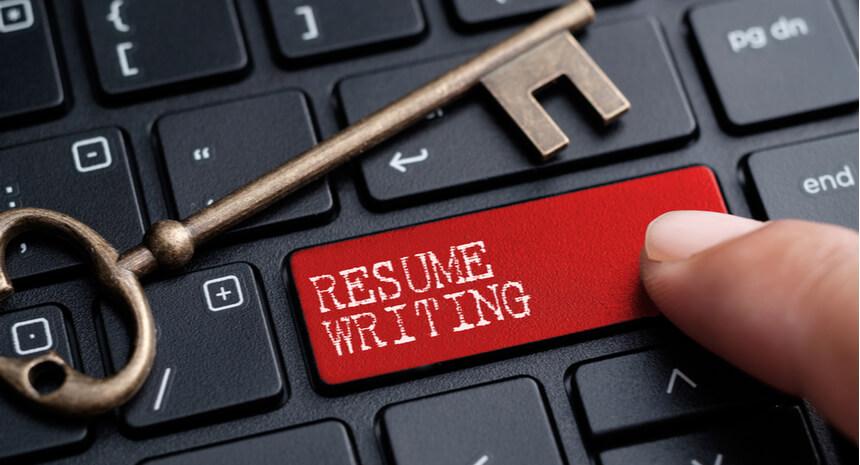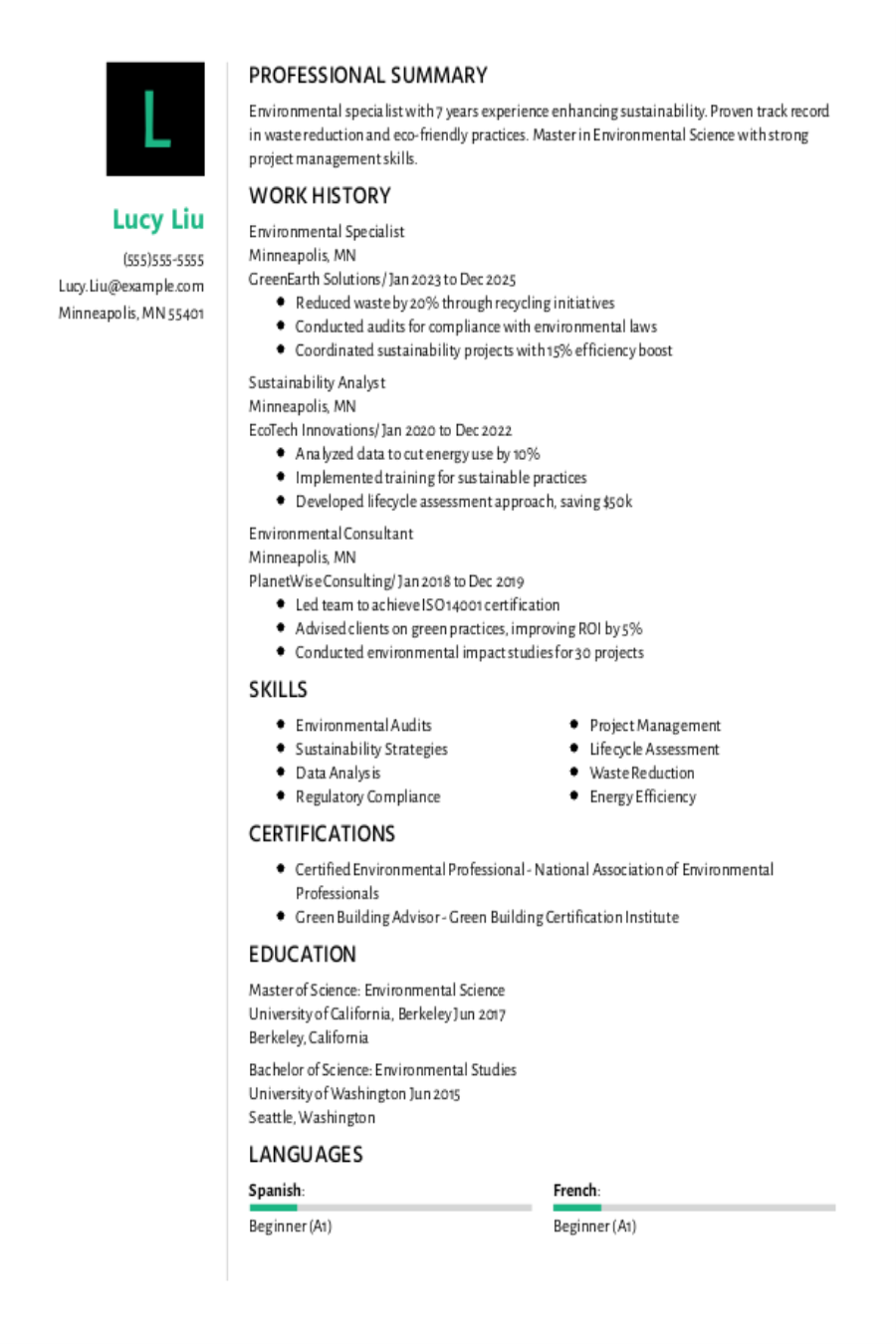Table of contents
Popular Dental Assistant Resume Examples
Entry-level dental assistant resume
An entry-level resume for a dental assistant should focus on relevant training, certifications, patient care skills, and any volunteer experience to demonstrate readiness for the role despite limited work history.
Places skills over experience: Using a functional resume format is strategic for this dental assistant as it highlights their skills in patient care and efficiency improvements, rather than merely listing early job experiences.
Focuses on goals: This applicant effectively transitions into a dental assistant role by highlighting their dedication to improving patient care and operational efficiency, showcasing a proactive approach to professional development in the dental field.
Mid-career dental assistant resume
A mid-career dental assistant resume should emphasize a combination of practical experience, technical skills, and ongoing professional development to effectively demonstrate growth and value in the dental field.
Begins with a powerful summary: This resume's professional summary starts by highlighting key skills experiences that make a dental assistant stand out. This clarity enables both recruiters and ATS to quickly recognize qualifications relevant to the position.
Includes mix of skills: This resume effectively mixes hard skills like dental procedures and medical record keeping with soft skills such as patient communication and team collaboration, highlighting the applicant's comprehensive capabilities.
Experienced dental assistant resume
An experienced dental assistant resume should prioritize highlighting specific skills, certifications, and achievements that demonstrate expertise and growth in the field of dental care.
Follows traditional format: The chronological resume format effectively showcases the job seeker's extensive experience, allowing for a clear representation of their career advancements and skills developed over time within the dental field.
Optimized for ATS: The resume uses a professional, clean template that merges an elegant header with an ATS-friendly resume layout, ensuring optimized readability for both hiring managers and automated screening systems.
No experience dental assistant resume
A resume for an applicant with no experience should highlight relevant skills, education, and any volunteer work to showcase the job seeker's potential and commitment to the field.
Draws from diverse experiences: Including volunteer experiences and extracurricular activities in a resume can improve it by showcasing valuable skills like teamwork and communication, which might not be evident in formal work history.
Overcomes lack of work history: By emphasizing strong patient care and communication skills, the job seeker demonstrates a readiness for the dental assistant role, despite limited direct experience in the field.
More resume examples
Dental Assistant Resume Template
Looking to make a great first impression? Use this dental assistant resume template as your starting point—just copy it and personalize it with your details.
Jane Smith
Riverside, CA 92509
(555)555-5555
Jane.Smith@example.com
Professional Summary
Dedicated Dental Assistant with 7 years of experience enhancing patient care, managing inventory, and streamlining processes. Expert in dental software. Proven track in boosting patient satisfaction by 20%.
Work History
Dental Assistant
Bright Smile Dental Clinic - Riverside, CA
January 2023 - September 2025
- Assisted in 30+ daily procedures
- Managed supplies inventory, reducing costs by 15%
- Improved patient satisfaction by 20% via efficient scheduling
Oral Care Specialist
Healthy Gums Dental Center - Lakeside, CA
January 2019 - December 2022
- Prepared patients for exams, enhancing comfort by 30%
- Handled patient records, improving accuracy by 95%
- Trained 5 new staff to improve team efficiency by 25%
Dental Care Intern
Pearl White Dental Associates - Lakeside, CA
January 2018 - December 2018
- Assisted with sterilizing instruments
- Recorded patient history for 200+ cases
- Supported front desk, reducing wait times by 10%
Skills
- Patient Care
- Dental Software Proficiency
- Instrument Sterilization
- Inventory Management
- Record Keeping
- Team Collaboration
- Time Management
- Appointment Scheduling
Education
Master of Health Sciences Dental Hygiene
Metropolis University Metropolis, New Jersey
June 2017
Bachelor of Science Biology
Metropolis University Metropolis, New Jersey
June 2015
Certifications
- Certified Dental Assistant - Dental Assisting National Board
- CPR Certification - American Heart Association
Languages
- Spanish - Beginner (A1)
- French - Intermediate (B1)
- German - Beginner (A1)
Must-Have Skills on a Dental Assistant Resume
A robust skills section is important for crafting a standout resume.
Healthcare and medical professionals make a direct impact on individual and community well-being. The skills you highlight should reflect your ability to deliver dependable support and uphold high standards. Your resume is a chance to show how you contribute meaningfully to quality care and positive outcomes.
The following data highlights the most frequently sought hard and soft skills for dental assistants based on Resume Now’s internal resume analysis.
When you’re ready to improve your resume with relevant skills, consider trying our AI Resume Skills Generator. It identifies both hard and soft skills tailored to your job title, helping you create a comprehensive and customized skill set.
Writing Your Dental Assistant Resume
Having explored these effective resume examples, you are now prepared to dive into the process of how to write a resume. We'll walk you through each section in detail, ensuring you have all the tools needed for success.
List your most relevant skills
A dental assistant resume skills section should highlight both clinical skills, such as skill in taking X-rays and assisting during procedures, and interpersonal skills like patient communication and teamwork. Incorporating keywords from the job listing not only catches the eye of hiring managers but also helps applicant tracking systems identify you as a strong applicant.
Incorporating relevant keywords demonstrates that you understand what the employer is seeking. By aligning your skills with their needs, you'll increase your chances of moving forward in the hiring process and landing that dental assistant position you desire.
Example of skills on a dental assistant resume
- Proficient in assisting with dental procedures and patient management
- Knowledgeable in maintaining sterilization protocols and infection control
- Excellent communicator with a compassionate approach to patient care
- Organized team player skilled in scheduling and administrative tasks
A strong skills section is key to showing your readiness for the dental assistant position. It should effectively combine technical skills specified in the job description, such as knowledge of dental procedures and equipment, along with essential soft skills like communication and patient care, illustrating your comprehensive ability to fulfill the role's demands.
Highlight your work history
Your work experience section is a key component of your dental assistant resume. It should emphasize not only your job duties but also your achievements in the role. By showcasing specific accomplishments, you can illustrate how you've effectively applied your skills to improve patient care and support the dental team, while incorporating relevant industry keywords.
For each position listed, include key details such as your job title, the name of the dental practice or employer, and the employment dates. This information helps establish professional credibility and allows employers to quickly assess your background and experience in a clinical setting.
Example of a dental assistant work experience entry
- Dental Assistant
Bright Smiles Dental Clinic - San Diego, CA
June 2021 - Present - Assist dentists during procedures by preparing instruments and materials to ensure efficient workflow and patient comfort
- Manage patient records and scheduling, improving appointment adherence by 30% through effective communication and follow-ups
- Educate patients on oral hygiene practices and aftercare instructions, contributing to a 20% increase in patient satisfaction scores
- Implement sterilization protocols for dental equipment, maintaining compliance with safety standards and reducing infection risks by 15%
- Train new dental assistants on office procedures and patient management techniques, improving team performance and service quality
Highlighting outcomes and achievements in your experience section showcases your contributions to the dental practice. Employers are drawn to applicants who can demonstrate real impact, such as improving patient satisfaction or increasing efficiency in procedures. By focusing on results rather than just responsibilities, you position yourself as a proactive team member ready to add value.
Include your education
The education section of your dental assistant resume should display your academic credentials in reverse-chronological order, starting with your most recent qualification. Include relevant degrees, diplomas, and certifications while omitting your high school diploma if you hold an associate degree or higher.
For those currently pursuing additional education or who have incomplete programs, it is important to list the highest level of education achieved along with an expected graduation date. Incorporating bullet points that outline significant coursework or academic accomplishments can help recent graduates or current students by showcasing their preparedness for the position.
Common certifications for a dental assistant resume
- Certified Dental Assistant (CDA) – Dental Assisting National Board (DANB)
- Registered Dental Assistant (RDA) – State Dental Boards
- Expanded Functions Dental Assistant (EFDA) – Commission on Dental Accreditation (CODA)
- Orthodontic Assistant Certification (OAC) – National Commission for Certifying Agencies (NCCA)
Sum up your resume with an introduction
Creating an effective profile section on your dental assistant resume is essential for making a strong first impression.
If you have significant experience in the field, consider using a professional summary. This approach allows you to highlight key achievements and skills that make you a standout applicant. If you have less experience, write a resume objective that reflects your career goals and professional development.
Professional summary example
Dedicated dental assistant with over 5 years of experience in a busy clinical setting. Recognized for improving patient care through effective communication and careful attention to detail. Proficient in chairside assistance, radiography, and infection control protocols, ensuring a safe and comfortable environment for patients.
Resume objective example
Enthusiastic dental assistant eager to use strong communication and patient care skills in a supportive dental practice. Committed to improving patient experiences while assisting the team with efficient procedures and maintaining a clean, welcoming environment for all clients.
As a dental assistant job seeker, your resume profile should be concise but packed with essential information. Aim to limit it to three sentences that highlight your most relevant skills and experiences. If you need to expand further, consider adding more details in your cover letter.
Add unique sections to set you apart
Including optional resume sections can improve your application as a dental assistant by highlighting your distinctive qualifications. These sections allow you to present aspects of your professional journey that set you apart from other applicants.
Consider adding details about relevant hobbies or volunteer experiences that align with the values of the dental field. For example, if you have participated in community health initiatives or have a passion for patient care through volunteering, sharing these experiences can demonstrate your commitment and skill set. By showcasing these facets, you provide employers with a more comprehensive view of who you are and what you bring to their team.
Three sections perfect for a dental assistant resume
- Languages: As a dental assistant, you frequently communicate with patients and staff. Highlighting your language skills on your resume can help build rapport with diverse patients, improving their comfort and understanding during visits.
- Volunteer Work: Including volunteer work on a resume highlights your dedication to helping others while improving your professional skills, making you a more attractive job seeker in the competitive dental assistant field.
- Accomplishments: As a dental assistant, measurable results highlight your contributions to patient care and office efficiency. Add these accomplishments to your experience section or list them separately in an achievements section.
5 Resume Formatting Tips
- Choose a format that matches your career stage.
Choosing the right resume format is important for showcasing your skills. If you’re an experienced dental assistant, a chronological format effectively highlights your career progression. For those just starting out, a functional format allows you to emphasize relevant skills over work history. Consider a combination format for a balanced approach that showcases both experience and abilities.
- Pick a smart resume template.
Using a professional resume template is key to improving readability. It lets your qualifications and experience shine without distraction. If you choose a custom layout, make sure it stays clean and uses ATS-friendly fonts for the best presentation.
- Select an appropriate font.
Choose a professional font like Helvetica, Georgia, or Verdana to improve your resume's readability. These options are great for both ATS and hiring managers.
- Use consistent formatting.
Ensure your resume is formatted with a clear left alignment and uniform margins. This creates a polished and professional look that improves readability.
- Keep your resume to one or two pages.
When crafting your resume, remember that resumes should be one page long. This approach helps keep your content concise and focused on the key details that showcase your skills and experience effectively.
What’s the Average Dental Assistant Salary?
Dental assistant salaries vary based on location, career level, and qualifications.
This data, provided by the Bureau of Labor Statistics, will show you expected salary ranges for dental assistants in the top 5 highest-paying states, including the District of Columbia. The figures reflect the most current salary data available, collected in 2024.
- Full Range
- Most Common (25th–75th percentile)
- Average
Minnesota
Most common: $60,320 - $68,410
Oregon
Most common: $53,090 - $59,800
District of Columbia
Most common: $55,650 - $58,640
Massachusetts
Most common: $49,130 - $61,190
Washington
Most common: $47,880 - $61,880
Tools for Your Job Search
Are you preparing to apply for that dental assistant position you've been eyeing? Before you hit send on your application, consider using our ATS Resume Checker. This essential tool provides valuable insights into how well your resume aligns with the automated systems many dental offices use for initial screening.
Looking to elevate your resume further? Our AI Resume Builder offers tailored recommendations specific to your dental assisting experience, along with professionally designed templates that highlight your skills and qualifications effectively.
Frequently Asked Questions
Last Updated: October 3, 2025
Absolutely. A cover letter is important because it adds context to your resume and creates valuable communication opportunities with employers. It’s your chance to explain why you’re excited about the dental assistant role and how your skills align with the job requirements. So, don’t hesitate—write a cover letter that showcases your enthusiasm and qualifications.
For a quick and effective solution, try our AI Cover Letter Generator. It allows you to create tailored cover letters in just minutes! Plus, you can choose from various cover letter template options that perfectly match your resume, ensuring a polished and professional presentation of your application.
A resume is generally concise, spanning one to two pages, and focuses on your skills and relevant work experience. In contrast, when creating a curriculum vitae (CV), you can extend it to several pages to provide in-depth information about your academic background, research contributions, publications, and professional experiences.
You’ll typically need a CV for roles in academia or specialized fields such as law and medicine. If you find yourself needing to create one, using an online CV Maker is an excellent solution. It allows you to craft tailored CVs quickly by using various CV templates designed for different industries and career levels—ensuring you present your best self effectively.
To write a strong CV, focus on structuring your information under clear headings such as Education, Work History, Skills, and Certifications. Consider using professional templates that are both visually appealing and optimized for applicant tracking systems. Tailor your content for each job application by integrating relevant keywords found in the job listing to improve your chances of being noticed.
For additional guidance, explore CV examples from professionals in the dental field. These samples can provide valuable insights into effective presentation styles and help you understand how to showcase your strengths in a way that resonates with potential employers.
Selecting the right resume format is important for showcasing your qualifications effectively. Inexperienced job seekers should opt for a functional format, which highlights skills over work history. Conversely, experienced professionals will benefit from a chronological format that showcases their career progression and accomplishments. For those in mid-level positions, a combination format strikes a balance by integrating both skills and experience, providing a comprehensive view of their capabilities.
To craft an impressive dental assistant resume, opt for a modern, professional template and tailor your content with keywords from the job description. This strategy effectively showcases your qualifications and aligns with employer expectations.
As a dental assistant, you can showcase your dedication to professional growth by obtaining relevant certifications. List any courses you've taken, seminars you've participated in, and insightful books or podcasts that keep you informed. Additionally, highlight your memberships in professional associations to illustrate your proactive approach to staying updated with industry trends.
Was this information helpful? Let us know!
Leisha is a career industry editor dedicated to helping job seekers excel in their careers.
More resources

How to Write a Resume: Guide & Examples for 2026
If you re wondering how to write a resume that grabs attenti...

Summary of Qualifications: 13 Examples for Your Resume
Our guide will help you write a summary of qualifications that...

Education Resume: Examples & Templates
As an educator you need a resume that captures the attention ...

Environmental Resume: Examples & Templates
As an environmental professional you need a resume that captu...



